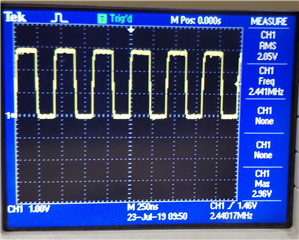static void bsp_event_handler(bsp_event_t event)
{
ret_code_t err_code;
switch (event)
{
case BSP_EVENT_SLEEP:
sleep_mode_enter();
break; // BSP_EVENT_SLEEP
case BSP_EVENT_DISCONNECT:
err_code = sd_ble_gap_disconnect(m_conn_handle,
BLE_HCI_REMOTE_USER_TERMINATED_CONNECTION);
if (err_code != NRF_ERROR_INVALID_STATE)
{
APP_ERROR_CHECK(err_code);
}
break; // BSP_EVENT_DISCONNECT
case BSP_EVENT_WHITELIST_OFF:
if (m_conn_handle == BLE_CONN_HANDLE_INVALID)
{
err_code = ble_advertising_restart_without_whitelist(&m_advertising);
if (err_code != NRF_ERROR_INVALID_STATE)
{
APP_ERROR_CHECK(err_code);
}
}
break; // BSP_EVENT_KEY_0
case BSP_EVENT_KEY_1:
NRF_LOG_INFO("\n Press Button key 1\n");
NRF_LOG_INFO("\n Erase the flash content !!\n");
// err_code = pcm_pstorage_eraseall();
// APP_ERROR_CHECK(err_code);
break;
case BSP_EVENT_KEY_2:
NRF_LOG_INFO("\n Start:PDM --> PCM\n");
err_code = nrf_drv_pdm_start();
APP_ERROR_CHECK(err_code);
break;
case BSP_EVENT_KEY_3:
NRF_LOG_INFO("\n Stop:PDM --> PCM\n");
// stop audio sample
nrf_drv_pdm_stop();
break;
default:
break;
}
}
static void drv_audio_pdm_event_handler(uint32_t *p_buffer, uint16_t length)
{
m_buffer_handler((int16_t *)p_buffer, length);
int i;
// for(i=0;i<= length;i++)
// {
// NRF_LOG_INFO("%s ",&p_buffer[i]);
// }
// NRF_LOG_INFO("\n ");
NRF_LOG_INFO("pdm event handler \n");
}
uint32_t drv_audio_init(drv_audio_buffer_handler_t buffer_handler)
{
// nrf_drv_pdm_config_t pdm_cfg = NRF_DRV_PDM_DEFAULT_CONFIG(CONFIG_IO_PDM_CLK,
// CONFIG_IO_PDM_DATA,
// m_pdm_buff[0],
// m_pdm_buff[1],
// CONFIG_PDM_BUFFER_SIZE_SAMPLES);
nrf_drv_pdm_config_t pdm_cfg = NRF_DRV_PDM_DEFAULT_CONFIG(CONFIG_IO_PDM_CLK,CONFIG_IO_PDM_DATA);
if (buffer_handler == NULL)
{
return NRF_ERROR_INVALID_PARAM;
}
m_buffer_handler = buffer_handler;
pdm_cfg.gain_l = CONFIG_PDM_GAIN;
pdm_cfg.gain_r = CONFIG_PDM_GAIN;
return nrf_drv_pdm_init(&pdm_cfg, drv_audio_pdm_event_handler);
}
int main(void)
{
bool erase_bonds;
// Initialize.
log_init();
timers_init();
buttons_leds_init(&erase_bonds);
power_management_init();
ble_stack_init();
gap_params_init();
gatt_init();
advertising_init();
services_init();
conn_params_init();
peer_manager_init();
// Start execution.
NRF_LOG_INFO("Template example started.");
application_timers_start();
// advertising_start(erase_bonds);
uint32_t err_code;
err_code = drv_audio_init(drv_audio_pdm_event_handler);
APP_ERROR_CHECK(err_code);
// Enter main loop.
for (;;)
{
idle_state_handle();
}
}
I have to connect a MIC working on PDM to nrf52 DK Board.For that, I have written the above code. But when I am testing I am not able to get the clock pulses at the defined pin. Also do not know at which Freq it is working?
And when I read the pdm documentation it says I need to change the PSEL.CLK register value? Then how should I do it and with what value? same for PSEL.DIN register. I am confused a lot. Please suggest me the solution to all my doubts.I have checked the clk pin on Oscilloscope, the clock is not being generated.In order to generate clk at pin number 22 of nrf52 DK board should I define pin clk as #define CONFIG_IO_PDM_CLK 0x22 or 0x16 (hex value of 22 )instead o rtf 0x22?



